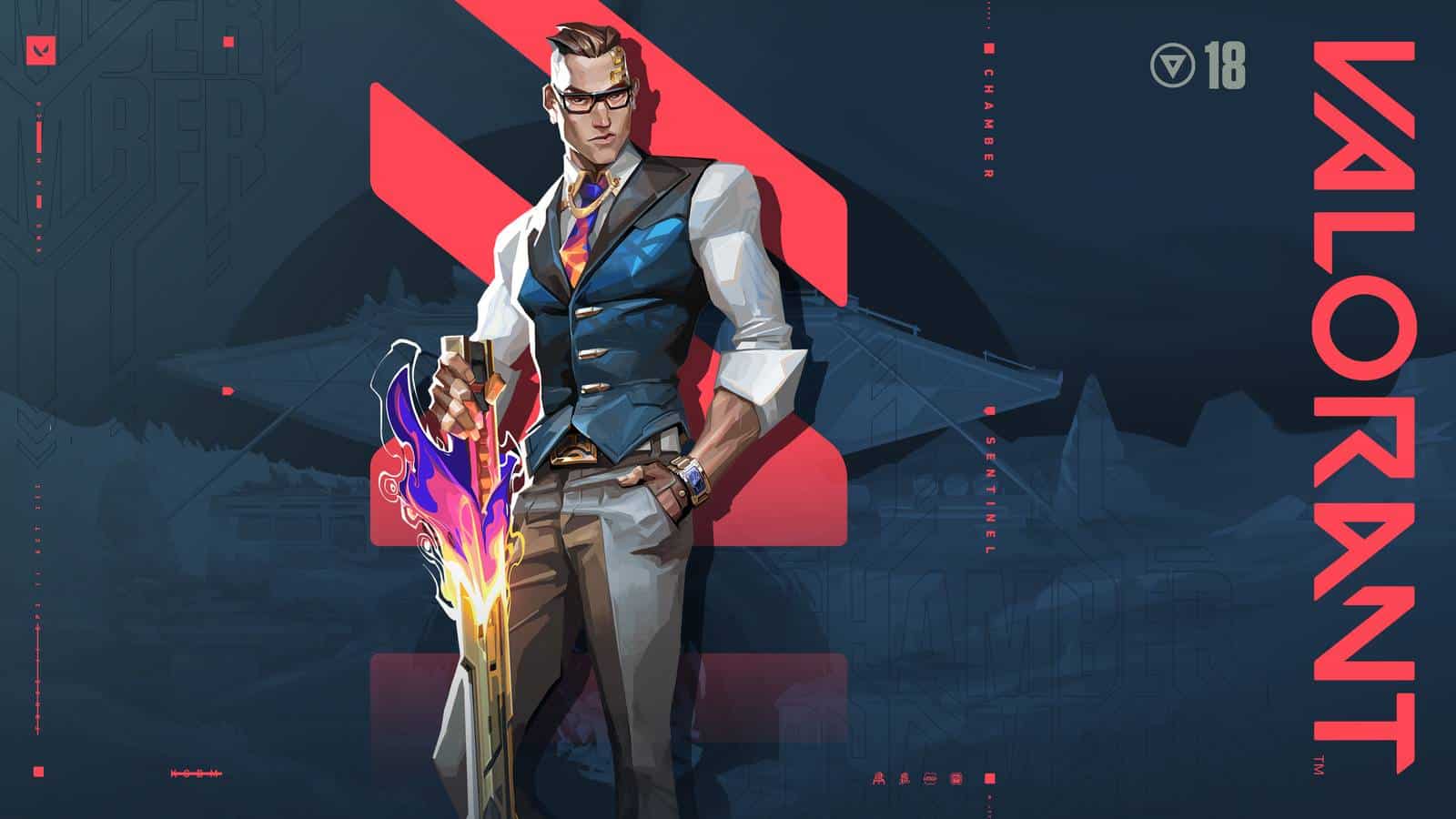Choosing a processor

I could go on and on about the importance of a processor for gaming, but to be brief – it's pretty darn important. A fast CPU will minimize FPS lows and maximize performance in-game. So, we should always aim for the best possible processor when buying a laptop for gaming.
Requirements
Valorant is a relatively new game, which means that performance-wise it doesn't need much from your processor. The minimum requirement is an Intel Core i3 or AMD Ryzen 3 with an Intel UHD Graphics 620 or Radeon Vega 3 Graphics (4th Gen). That's pretty decent and you can enjoy Valorant on low graphics settings with a decent framerate (40-60 FPS).
If you want to maximize performance and see even more graphics effects, I recommend upgrading to an Intel Core i5 or AMD Ryzen 5. For top performance and to experience the highest graphics settings available, I recommend opting for an Intel Core i7 or AMD Ryzen 7.
Recommendations
It's not easy to recommend a single best laptop processor for playing Valorant. It really depends on what you want from your gaming laptop. That said, here are some excellent processors at each price bracket:
- i3-10110U – the minimum requirement for low graphics settings
- i5-1135G7 – good all-around performer that will max out at 60 FPS on high graphics settings
- i5-10500H – top performer that will max out at 144 FPS on high graphics settings
My graphics card recommendations for Valorant
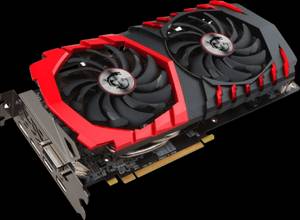
In the event that you're still scratching your head as to what the heck Valorant is, I'm going to keep this one short. I have some sound advice on which graphics card you should pick for playing Valorant, depending on your budget.
Minimum graphics (under $1000)
If you're not a wealthy gamer and can't spare a thousand bucks, then don't worry – integrated graphics will get you by. In particular, Intel UHD Graphics 620 or AMD Radeon Vega 8 will take care of the job at a measly 30 FPS on low settings. It's not going to be a great experience, but it'll do in a pinch.
Recommended graphics ($1000 – $1600)
If you want to play Valorant with high framerates, I recommend GTX 1650 or Radeon RX 5600M. These cards will be able to keep the framerate around 60 FPS on medium settings without too much of a struggle. Not too shabby!
Best graphics ($1600 and up)
For those who can afford the best video cards money can buy, then RTX 3050 is what I recommend. This card will allow smooth gameplay at around 120 FPS on ultra settings in Full HD. And if you have a high refresh rate panel, then you'll get 144+ FPS with no problems whatsoever.
- if you can't afford a good graphics card, then get a laptop with integrated graphics
- if you can afford a good graphics card, then get GTX 1650 or Radeon RX 5600M for medium settings, and RTX 3050 for ultra settings
Choosing a memory
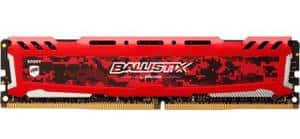
The good news is – laptop RAM is very easy to get right since we don't need to care much about memory frequency or latency. In the laptop world, all of these secondary metrics sit in a very narrow range. Apart from enthusiast-grade gaming notebooks, every single one has a very similar memory setup, usually strongly tied to the processor and laptop's price bracket. The only spec that is worth your time to get it right is the total memory size. So let's talk about that.
Minimum (8 GB)
First of all, I should mention that you could get away buying an 8GB RAM laptop. Though that's acceptable in a single situation – you're on an uncomfortably tight budget, and you could upgrade the 8GB laptop with an extra RAM stick.
Recommended (16 GB)
If you aren't in this situation – stick with 16 GB. That's the sweet spot for gaming, work, and everything in-between. I might consider 32 GB to be more future-oriented than 16 GB, but if you don't particularly care whether you're ahead of the pack or not – 16 GB is still a considerable amount of memory for most.
Best (32 GB)
Let me ask you a couple of questions. Do you care about streaming your gameplay, keeping multiple games open, or using Chrome 100 tabs open? If that sounds like you – consider paying a premium for a 32GB model. Is there a benefit going beyond that? Sure, the more, the merrier, but it's not necessary by any standard, and I'd instead invest in other components, such as CPU or GPU.
- you don't need to care about memory frequency or latency when buying RAM for a laptop
- 8GB is enough if you're on an uncomfortably tight budget and can upgrade the RAM later on
- 16GB is the sweet spot for gaming, work, and everything in between
- 32GB might be worth it if you care about streaming your gameplay or using Chrome 100 tabs open at once
My storage recommendations for playing Valorant
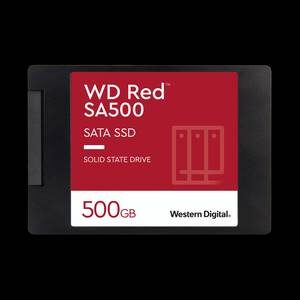
You're one of the best, right? You play games with people that are your equal. You need a lot of space for your games, don't you? We can do this!
HDD or SSD?
When it comes to storage, HDD is not an option. There's no way around it – if you want to play Valorant on a laptop, you'll need an SSD. Why? Well, let's start with the basics. Solid State Drives are just better than hard drives when it comes to speed and reliability. With HDDs, data has to move along physical spinning disks which limits their throughput speed. SSDs use solid-state chips that store data electronically – they're up to 100x faster than hard drives and more reliable in general. That's why we'll be sticking to laptops with SSDs only and resorting to HDDs as a crutch in our cheapest recommendations.
Finding the right size
I know you might be intimidated by the idea of choosing the right size – but don't worry! It's not rocket science. There are three major points that will help you pick the perfect amount of storage: minimum, recommended, and best possible. It's not like you're buying an automobile here – more storage is always better, especially if you like variety in your games library. The minimum is 256 GB (and only for ultra-budget laptops), while 512 GB is perfect for most players; 1 TB SSD is reserved for hardcore players with expansive game libraries; 2 TB SSD should cover all the bases for any gamer worth their salt (I don't think I need to mention 4 TB drives).
- choose your storage wisely
- pick the right size based on your storage needs (256 GB for ultra-budget laptops, 512 GB for most players, 1 TB SSD for hardcore players, 2 TB SSD for anyone worth their salt)
The right display

The time has come for us to talk about gaming displays. Displays are one of the most crucial elements of a gaming laptop, and one of the hardest to compare. It's like asking: what do you want out of a car? Faster, better handling, more space? Or something else? And that's the thing with monitors – it's all personal preference. I'll list some general specs, and then we'll discuss how to decide what's essential and what's not.
Resolution
As long as you're playing competitive first-person shooters (CoD: Warzone) – Full HD is more than enough. For those who need an upgrade – 1440p will be adequate for any modern game. 4K? Not yet. The framerate on most games doesn't hit 100 FPS on laptops, and pixel density will be noticeably worse than on higher resolutions. If you want a super expensive gaming laptop – then go ahead and buy 4K.
Refresh rate
If you're into competitive first-person shooters – then high refresh rates are indispensable. But if you're looking for a display with impeccable image quality – don't fret over it too much. A high refresh rate does not impact input latency or frame delay significantly, so there's no need to splurge on a 240Hz screen just for CoD: Warzone. Instead, put your money towards a laptop with a higher resolution screen instead of a fast refresh rate display.
Response time
It is possible to find a 120Hz display without compromising response time significantly. As for G-Sync and FreeSync – these techniques are not as helpful in first-person shooters as they are in other genres such as RPGs or MMOs. In these games, response time is more critical to gameplay success than high framerates or even screen tearing elimination.
As a passionate gamer and laptop enthusiast, I know that finding the best laptop for Valorant can be a challenging task. Valorant is a fast-paced, competitive first-person shooter (FPS) that requires quick reflexes and precision aiming. Unlike many other games in the genre, Valorant emphasizes strategic gameplay and diverse character abilities, adding an extra layer of complexity to the experience. Consequently, a laptop that can handle the game's demands while providing an enjoyable gaming experience is crucial for anyone looking to excel in this popular title.
In my quest to identify the ideal laptop for Valorant enthusiasts, I have reviewed an extensive spreadsheet of recent laptop releases, comparing specifications and reviews from both professional critics and fellow gamers. By narrowing down the top laptops based on topic-specific requirements and various price ranges, I aim to provide you with a comprehensive guide that will help you make an informed decision about your next gaming laptop purchase.
When selecting the perfect laptop for Valorant, it is essential to consider factors such as high refresh rate displays, which can significantly improve your in-game performance, and low input lag, which can be the difference between winning and losing a clutch situation. Additionally, a laptop with a reliable cooling system can prevent thermal throttling, ensuring that your device performs optimally even during the most intense matches. As a regular visitor to the Valorant subreddit and an avid follower of professional players, I understand the importance of these factors and have incorporated them into my laptop selection process. By the end of this guide, you'll be well-equipped to find the best laptop for Valorant that suits your needs and budget.
FAQ
Q: What is the best laptop for playing Valorant?
The best laptop for playing Valorant in 2023 would be the HP Omen 17, with its powerful specifications and high-end components. However, it comes with a hefty price tag of $3,470. If you're looking for a more affordable option without compromising too much on performance, the Lenovo Legion 5 Pro 16 and the ASUS ROG Strix G15 G513RM are excellent choices, priced at $700 and $1,700 respectively.
Can Valorant run on a budget laptop?
Yes, Valorant can run on a budget laptop. The minimum requirements for Valorant include an i3-10110U processor, integrated graphics, 8 GB of RAM, and a 256 GB SSD. While it won't offer the best performance, it should be sufficient to run the game at low settings. Keep in mind that budget laptops may struggle to maintain a high frame rate or provide a smooth gaming experience.
What are the system requirements for Valorant on a laptop?
The system requirements for Valorant on a laptop vary depending on the desired performance level. For minimum settings, you'll need an i3-10110U processor, integrated graphics, 8 GB of RAM, and a 256 GB SSD. For medium settings, aim for an i5-1135G7 processor, a GTX 1650 graphics card, 16 GB of RAM, and a 512 GB SSD. If you want to enjoy Valorant at maximum settings, go for an i5-10500H processor, an RTX 3050 graphics card, 32 GB of RAM, and a 1 TB SSD.
Is a dedicated graphics card necessary for playing Valorant on a laptop?
While Valorant can run on integrated graphics, a dedicated graphics card is recommended for a smoother gaming experience and better visual quality. Integrated graphics, as found in budget laptops, may struggle to deliver high frame rates and may not be capable of running the game at higher settings. To truly enjoy the game and take advantage of the graphics options, a laptop with a dedicated graphics card such as the GTX 1650 or the RTX 3050 is recommended.
Can I play Valorant on an integrated graphics laptop?
Yes, you can play Valorant on an integrated graphics laptop. The game's minimum system requirements include integrated graphics, although it's important to note that the performance may be limited. Integrated graphics are typically less powerful than dedicated graphics cards, so you may need to lower the settings and resolution to achieve a playable frame rate. To fully enjoy Valorant, it is recommended to have a laptop with a dedicated graphics card.
Which laptops offer the best performance for Valorant?
In terms of performance, the HP Omen 17, Lenovo Legion 5 Pro 16, and ASUS ROG Strix G15 G513RM are among the top contenders for playing Valorant. These laptops come with powerful processors, dedicated graphics cards, and ample RAM and storage options to handle the game at high settings. The HP Omen 17 offers the highest performance but comes with a higher price point, while the Lenovo Legion 5 Pro 16 and ASUS ROG Strix G15 G513RM strike a good balance between performance and affordability.
How much RAM is needed to play Valorant on a laptop?
To play Valorant comfortably on a laptop, 8 GB of RAM is the minimum requirement. This should be sufficient for running the game at lower settings. However, for a smoother experience and better multitasking, we recommend opting for 16 GB of RAM. This will allow you to run Valorant alongside other applications without experiencing significant performance drops. If you're looking for future-proofing or running other memory-intensive tasks, 32 GB of RAM can provide additional headroom.
Are gaming laptops necessary for playing Valorant?
Gaming laptops are not necessary to play Valorant, but they can enhance the gaming experience. Gaming laptops are designed with more powerful components, such as dedicated graphics cards, to handle demanding games like Valorant. While it is possible to play Valorant on a non-gaming laptop, you may need to compromise on graphical settings and performance. Gaming laptops offer better cooling solutions, higher refresh rate displays, and customizable features tailored for gamers.
Is a high refresh rate display important for playing Valorant on a laptop?
While not essential, a high refresh rate display can significantly enhance the gaming experience when playing Valorant. A high refresh rate display, such as those with a refresh rate of 120Hz or 144Hz, allows for smoother gameplay, reduced motion blur, and improved responsiveness. This can give you a competitive edge in fast-paced games like Valorant. However, if you prioritize budget or portability, a standard
5 Best Laptops for Valorant
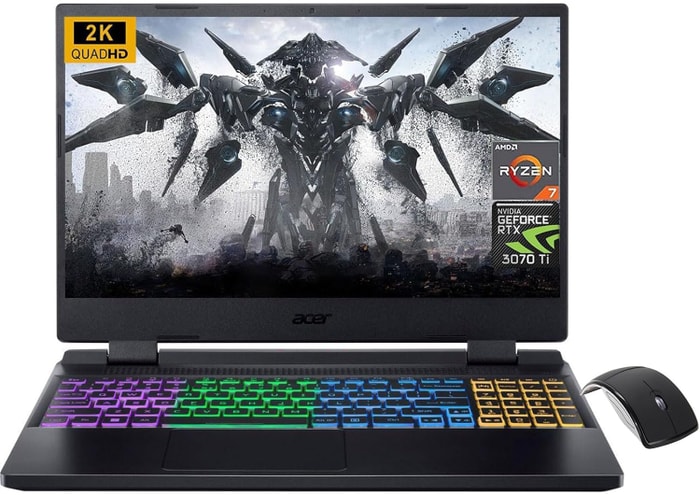 $680
$6801.acer Nitro 5
Valorant laptop- Excellent processor (Ryzen 7 6800H)
- Splendid graphics card (RTX 3070 Ti)
- Superb display (15.6)
- Awesome memory amount (32GB)
- No IPS Panel (limited viewing angles)
Alternatives
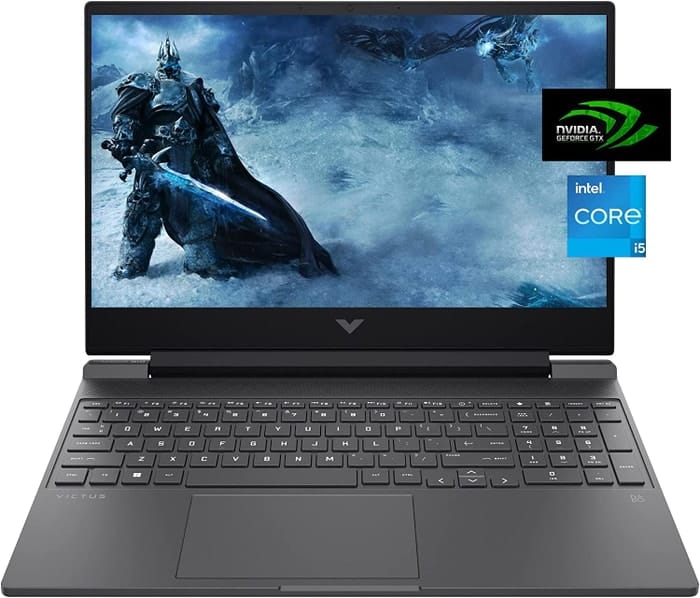
HP Victus 15
- Strong entry-level gaming performance
- Solid productivity performance
- Mediocre display and webcam quality
- Too much pre-installed software
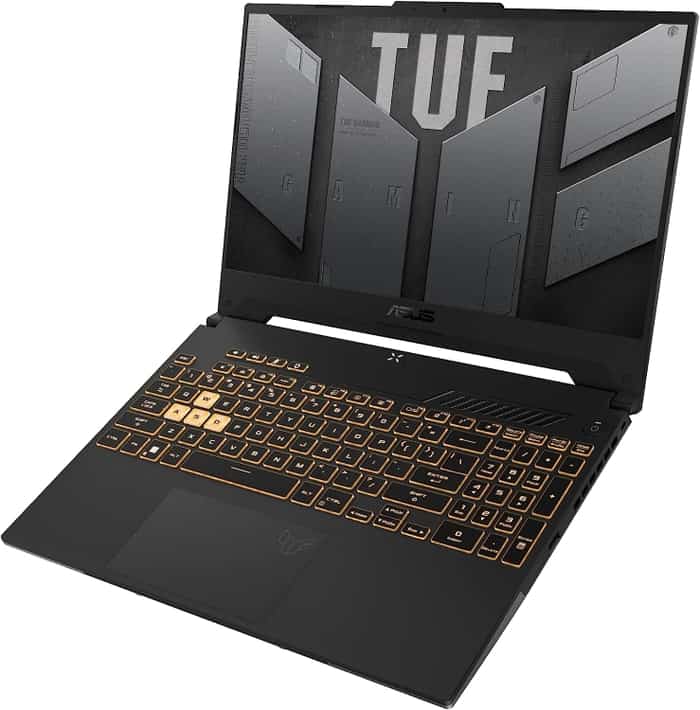
2.ASUS TUF F15 FX507VU-ES53
ASUS TUF F15 FX507VU-ES53: A budget gaming laptop with superb gaming performance and strong productivity capabilities, but falls short in webcam, touchpad, and speaker quality.- Superb 1080p gaming performance
- Strong productivity capabilities
- Great value for the price
- Poor webcam, touchpad, and speaker quality
- Some games may appear washed out on display
Summary
The ASUS TUF F15 FX507VU-ES53 is an affordable gaming laptop that excels in delivering superb 1080p gaming performance and strong productivity capabilities. It offers great value for the price. However, the laptop suffers from a poor webcam, touchpad, and speaker quality, and some games may appear washed out on its display.
Alternatives

ASUS TUF Dash F15
- Lightweight and well-built
- Good display options, including FHD 300Hz and QHD screens
- Some quirks affecting everyday ergonomics
- Ports mostly located on the left edge
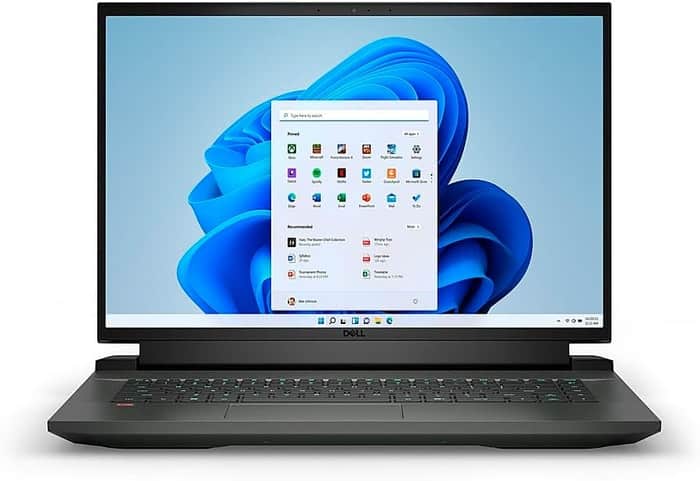
3.Dell G16
The Dell G16 is a powerful and affordable gaming laptop, but falls short in display quality, battery life, and portability.- Relatively affordable
- Powerful performance
- Good cooling system
- Mediocre display quality
- Below-average battery life
- Heavier and thicker than competitors
Summary
The Dell G16 impresses with its gaming and productivity performance, making it a budget-friendly option for those needing robust software. However, its lackluster display, below-average battery life, and lack of portability are notable drawbacks.
Reviews
Alternatives
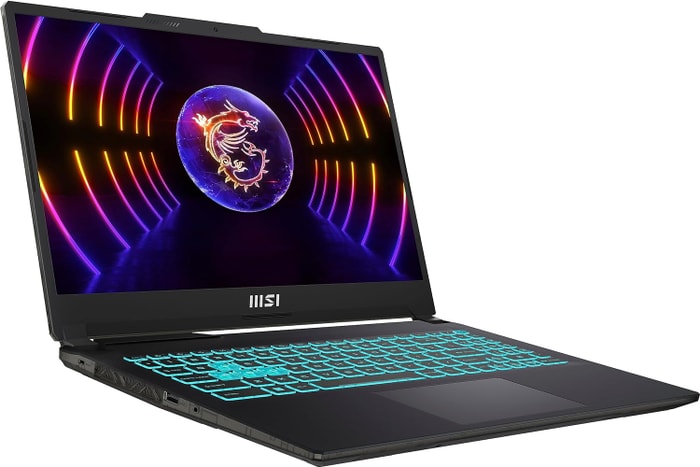 $1,430
$1,430MSI Cyborg 15
- Able to play at the highest 1080p settings
- Peppy processor for the money
- Display is dim and disappointing
- Sharp chassis edge can dig into wrists during typing
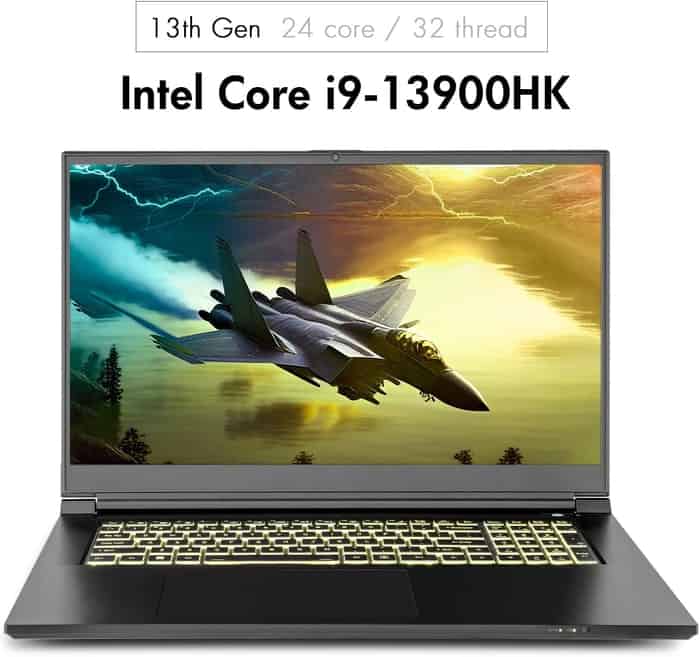
4.Sager NP7881C
Valorant laptop- Great processor (i9-13900HX)
- Monumental 4TB SSD
- Numpad
- Middle-of-the-road graphics card (RTX 4050)
- Bulky (6.27 lbs)
- No IPS Panel (subpar viewing angles)
Alternatives
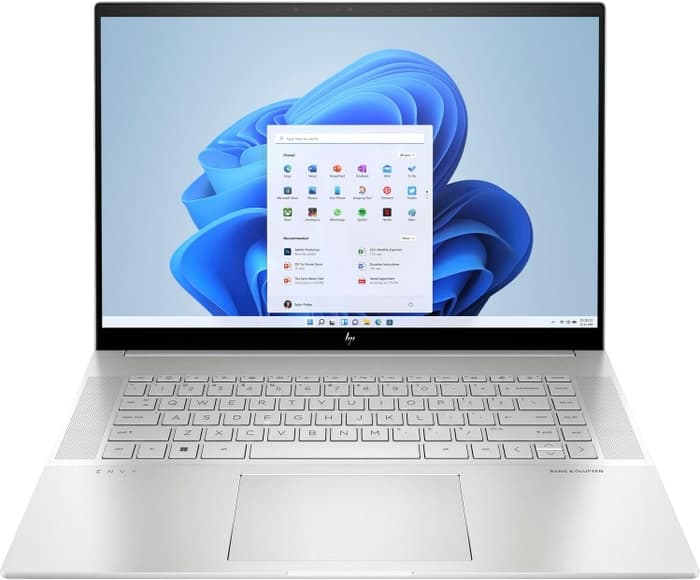
HP Envy 16
- Plenty of CPU and GPU power
- New 120Hz screen refresh rate
- Merely adequate base screen
- Optional OLED has fewer pixels than before

5.HP Omen 17
HP Omen 17: A high-end gaming laptop with impressive performance and advanced features, but suffers from noise and battery life issues.- QHD display with 165 Hz
- Advanced Optimus technology
- Expandable working memory
- PCIe-4 SSD with space for a second SSD
- Slightly below-average performance for an RTX 4080
- High noise level
Summary
The HP Omen 17 is a powerful gaming laptop with a Core i9 processor and GeForce RTX graphics, making it ideal for video processing, rendering, and QHD gaming. It boasts a QHD display with a high refresh rate, expandable memory, and Thunderbolt 4 support. However, it falls slightly below average in terms of RTX 4080 performance, has a noisy fan, and offers a meager battery life.
Reviews
Alternatives
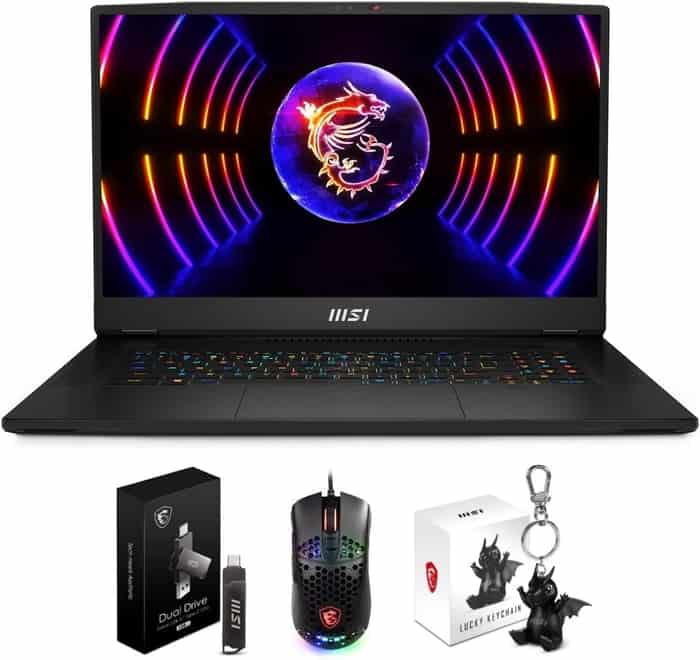
MSI Titan GT77HX 13VI-042US Pro Extreme
- Excellent mechanical keyboard
- Class-leading Mini-LED display
- Uninspired design
- Short battery life
Table of the Best Laptops for Valorant
| Laptop | Price (approx) |
| acer Nitro 5 | $680 |
| ASUS TUF F15 FX507VU-ES53 | $1,100 |
| Dell G16 | $1,510 |
| Sager NP7881C | $1,850 |
| HP Omen 17 | $4,290 |

